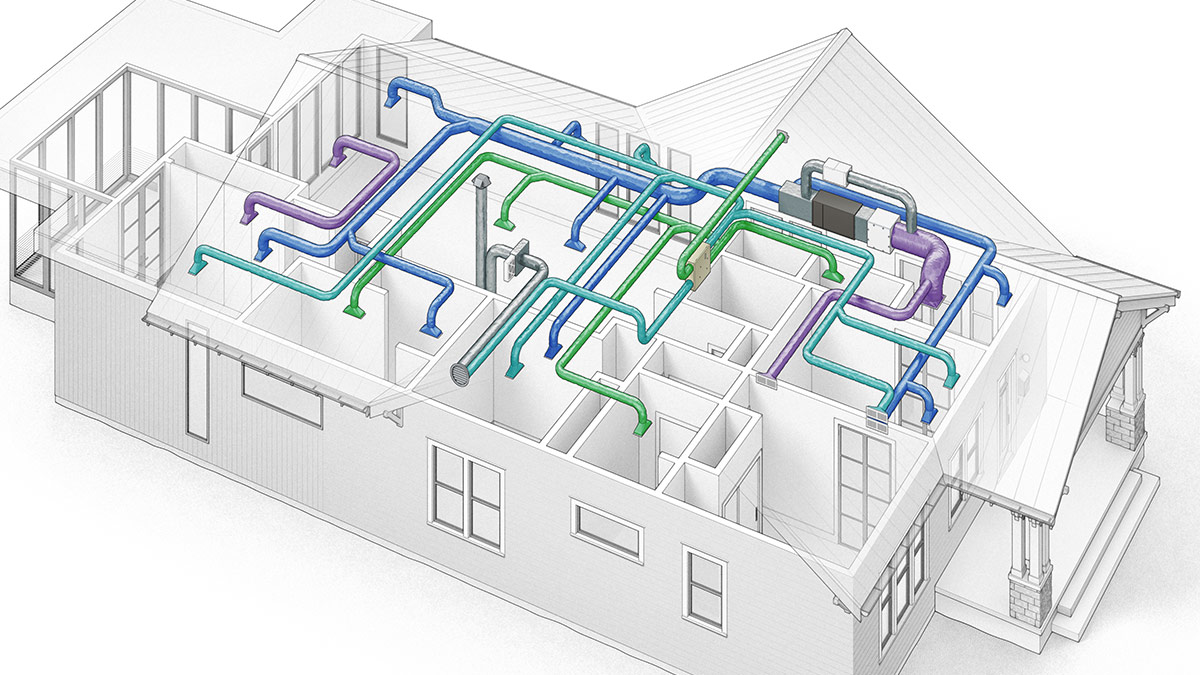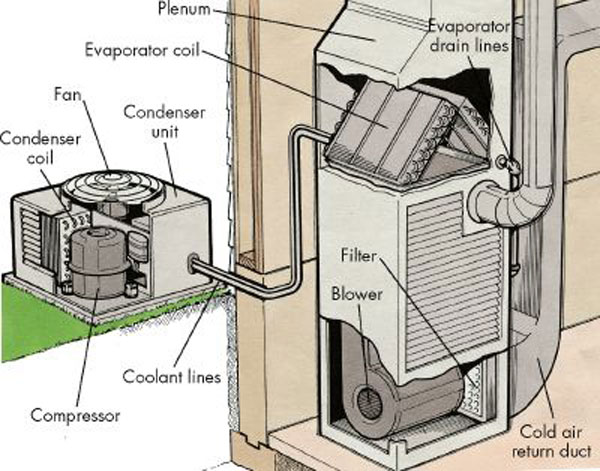Checking Out the Important Elements of an Effective HVAC System
An effective a/c system is improved numerous critical components that operate in harmony. Each component, from the thermostat to the ductwork, plays an essential role in maintaining comfort and power efficiency. Understanding these elements is critical for optimizing efficiency and improving indoor air quality. As one checks out these elements, the elaborate connections between them expose insights into improving total system effectiveness. What specific aspects contribute most to this effectiveness?
The Function of the Thermostat in Heating And Cooling Efficiency

Commonly ignored, the thermostat plays a critical role in the efficiency of HVAC systems. This little gadget serves as the primary control facility, regulating temperature level settings and ensuring ideal comfort within a room. By accurately picking up the ambient temperature level, the thermostat connects with the ventilation, air, and home heating conditioning devices to maintain the desired environment
An efficient thermostat decreases power usage by activating the HVAC system just when needed, consequently preventing excessive heating or air conditioning. Modern programmable and wise thermostats enhance this performance additionally by allowing users to set timetables and remotely readjust settings, adjusting to everyday routines.
Furthermore, the placement of the thermostat is essential; incorrect place can result in inaccurate temperature readings, causing inefficient procedure. On the whole, a well-functioning thermostat not just boosts convenience however additionally adds noticeably to power cost savings and the long life of the HVAC system.
Understanding the Significance of Air Filters
Air filters serve an essential function in HVAC systems by assuring that the air flowing within an area continues to be healthy and balanced and clean. These filters catch dirt, irritants, and various other pollutants, avoiding them from being recirculated throughout the setting. By catching these particles, air filters add to boosted indoor air high quality, which can substantially profit owners' health, especially those with allergic reactions or respiratory system problems.
Furthermore, preserving tidy air filters enhances the performance of heating and cooling systems. Clogged up filters can limit air movement, triggering the system to work more difficult to preserve desired temperatures, bring about raised energy consumption and greater energy expenses. Consistently changing or cleansing filters is a vital upkeep step that can lengthen the life-span of HVAC tools. Eventually, understanding the importance of air filters allows home owners and building supervisors to take proactive steps to guarantee a well-functioning, effective HVAC system that advertises a risk-free and comfy indoor setting.

The Capability of the Heater and Heatpump
Heaters and heat pumps are essential parts of HVAC systems, accountable for supplying warmth during cooler months. Heaters run by heating air via burning or electrical resistance, after that distributing it throughout the home using ducts. They typically provide fast home heating and can be fueled by gas, power, or oil, depending upon the system kind.
Conversely, heat pumps move heat instead of create it. They draw out heat from the outdoors air or ground, even in low temperature levels, and move it indoors. HVAC experts. This double capability allows heatpump to likewise give cooling in warmer months, making them flexible choices for year-round environment control
Both systems require appropriate upkeep to assure effectiveness and durability. While heating systems master extreme cold, heatpump can be helpful in modest climates. Comprehending their unique capabilities help house owners in selecting one of the most ideal choice for their home heating needs.
Discovering the Air Conditioning Unit
The cooling unit is an essential component of cooling and heating systems, available in different kinds to match various demands. Understanding the effectiveness ratings of these units is important for making notified options regarding energy consumption and expense. This section will explore the diverse kinds of ac unit and make clear just how performance ratings effect performance.
Kinds Of Air Conditioners
While numerous elements affect the option of a/c systems, understanding the different kinds offered is important for house more info owners and building supervisors alike. Central air conditioning conditioners are created to cool down entire homes or structures, making use of a network of air ducts for air movement. Window units supply a more localized option, suitable for little rooms or solitary areas. Mobile a/c unit provide adaptability, enabling users to relocate the system as needed. Ductless mini-split systems are one more option, integrating the efficiency of central systems with the ease of zoning, as they need no ductwork. Ultimately, geothermal systems harness the earth's temperature for energy-efficient air conditioning. Each type comes with unique benefits, making informed selections necessary for efficient environment control.

Performance Rankings Described
Comprehending efficiency rankings is necessary for picking the ideal cooling system, as these metrics provide understanding right into the system's efficiency and energy intake. The most usual ranking for a/c unit is the Seasonal Power Effectiveness Ratio (SEER), which determines the cooling output throughout a regular air conditioning period separated by the total electrical power input. A higher SEER suggests far better efficiency. Additionally, the Power Effectiveness Proportion (EER) is made use of for gauging effectiveness under details conditions. An additional important metric is the Power Celebrity accreditation, which indicates that an unit fulfills strict power efficiency guidelines. By evaluating these scores, customers can make informed choices that not only enhance convenience yet also lower energy expenses and ecological influence.
The Significance of Ductwork and Airflow
Reliable ductwork design and air flow monitoring play critical functions in the general effectiveness and efficiency of HVAC systems. Correct ductwork assurances that conditioned air is distributed uniformly throughout an area, decreasing temperature fluctuations and enhancing comfort. Well-designed ducts decrease resistance to air flow, minimizing the workload on HVAC devices and eventually decreasing power consumption.
Air flow administration involves strategically placing vents and signs up to enhance the flow of air. This avoids usual concerns such as cool or hot spots, which can occur when air movement is blocked or inadequately well balanced. In addition, the appropriate air duct products and insulation can better boost performance by minimizing warm loss or gain throughout air transit.
An effective ductwork system not just contributes to energy financial savings but can also prolong the life-span of cooling and heating tools by decreasing unnecessary pressure (HVAC experts). As a result, understanding the significance of ductwork and airflow is crucial for accomplishing peak heating and cooling system efficiency
Regular Upkeep Practices to Enhance Efficiency
Normal upkeep methods are essential for guaranteeing peak performance of HVAC systems. These methods include routine inspections, cleansing, and required repairs to keep the system running efficiently. Consistently changing air filters is important, as clogged up filters can obstruct air flow and lower effectiveness. Additionally, technicians ought to check and tidy evaporator and condenser coils to avoid overheating and energy wastage.
Annual professional examinations are also recommended, as experienced specialists can identify prospective issues prior to they rise. Oiling moving parts minimizes deterioration, adding to a much longer life-span for the system. Additionally, guaranteeing that the thermostat works appropriately help in keeping ideal temperature level control.

Often Asked Inquiries
How Commonly Should I Change My Thermostat?
Thermostats should commonly be replaced every 5 to one decade, depending upon use and innovation advancements. Normal checks are advisable to ensure peak efficiency, particularly if experiencing inconsistent temperature control or boosted energy expenses.
What Size Air Filter Is Ideal for My HVAC System?
The best dimension air filter for an a/c system varies by unit style. Generally, it's crucial to get in touch with the owner's manual or inspect the existing filter dimensions to guarantee peak efficiency and air top quality.
Can I Mount a Warm Pump Myself?
Setting up a heatpump individually is possible for proficient people, yet it calls for expertise of neighborhood codes and electric systems. Employing a professional is advised to assure correct installment and suitable system performance.
How Do I Know if My Ductwork Is Reliable?
To determine ductwork performance, one need to inspect for leaks, measure air flow at vents, inspect insulation top quality, and examine temperature differences between supply and return air ducts. Expert assessments can give complete insights right into total performance.
What Are Signs My A/c Demands Immediate Maintenance?
Indicators that a heating and cooling system needs immediate maintenance consist of unusual sounds, irregular temperatures, raised power bills, undesirable smells, and constant cycling. Addressing these problems immediately can prevent further damages and assurance optimal system performance.
Air filters serve an important function in HVAC systems by guaranteeing that the air distributing within an area stays tidy and healthy. In addition, maintaining tidy air filters boosts the efficiency of A/c systems. Ductless mini-split systems are an additional option, incorporating the efficiency of main systems with the benefit of zoning, as they need no ductwork. Recognizing efficiency ratings is crucial for choosing the appropriate air conditioning unit, as these metrics offer understanding into the system's performance and power intake. The best size air filter for a Cooling and heating system varies by unit style.